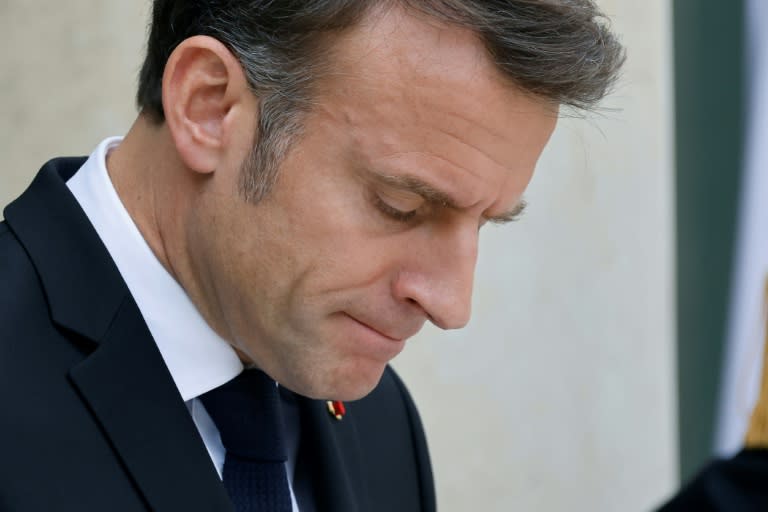Questions over France's future loom large at EU summit

Even before President Emmanuel Macron arrived in Brussels for the latest summit on Thursday, the question on everyone's lips was what France's government will look like after a snap vote that could bring the far right into government.
With a population of 68 million, France is the European Union's second biggest economy and a political heavyweight in the 27-member bloc, often setting the tone of debates.
Therefore stability in France is always in Europe's interest.
Macron stunned friends and rivals alike by calling a snap vote after his pro-European party received a drubbing from the far-right National Rally in EU elections this month.
Now Paris's allies worry a tumultuous period for France could threaten instability at home and abroad as the country enters uncharted territory.
The elections are "not officially" on the leaders' agenda as they meet for a two-day summit in the Belgian capital, "but of course that's what everyone talks about", admitted Hungarian premier Viktor Orban.
"France is the decisive country in Europe, big things can happen there on Sunday. Everybody knows that," Orban told reporters in Brussels.
The Hungarian nationalist -- who often locks horns with Macron -- is doubtless savouring the moment.
On the other side of the European political spectrum, social democrat German Chancellor Olaf Scholz on Sunday expressed his "concerns" about the French vote, hoping "that parties not" attached to the National Rally's Marine Le Pen won the vote.
His concerns are shared by Macron's European centrist allies. "It's very worrying to see France shift to the extreme right," said a pro-Macron French lawmaker.
The stage is set for a showdown between Macron, whose mandate runs until 2027, and National Rally leader Jordan Bardella, who says he intends to be prime minister if his party wins an absolute majority in France's National Assembly.
Bardella has already said he intends to name France's next representative in the European Commission if he wins the elections after two rounds on June 30 and July 7.
But the French presidency refused to entertain such a notion, insisting it was a decision only Macron would want to make.
"He will not give up on the French commissioner," said a source close to the French leader.
- Rough seas ahead -
The past offers little guidance: during the left-right power-sharing governments of the 1980s and 1990s, the president and prime minister would each choose a candidate to be a commissioner but today there is only one position for France.
Le Pen has dismissed the argument the president would retain the upper hand on defence and diplomacy if a far-right prime minister takes office.
The title of head of the armed forces is "honorific, because it's the prime minister who holds the purse strings," she said.
Macron refused to comment on the issue on the summit sidelines, but his supporters have criticised an attempt by Le Pen to distort the constitution.
Yet a number of his allies admit, off the record, that it would not be plain sailing between National Rally and Macron.
The biggest issue at stake is France's relationship with Ukraine, which the French president has pledged to support in the face of Russia's aggression.
He may not be able to deliver the three billion euros ($3.2 billion) promised in aid to Ukraine this year, an international affairs expert in Macron's camp said.
"Ukrainians are worried" because the National Rally -- long assailed for its cosy relationship with Russia -- has "only rallied half-heartedly to support Kyiv", the expert said.
Despite that, Ukraine's President Volodymyr Zelensky has voiced hope that whatever the result, he will still be able to count on Paris.
"We believe that the French will continue to support Ukraine regardless of the political situation," Zelensky told AFP.
- Weakened on European stage? -
There is also a broader question of how Macron's influence in Europe would be affected, especially since his party's European grouping appears for now to have slipped behind the group of Italy's far-right leader Giorgia Meloni as the EU parliament's third largest.
For now, the French presidency acts as if nothing has changed. The agreement concluded between the right, socialists and liberals to share the EU "top jobs" shows Macron is still "at the heart" of it all, an advisor said.
"He has strong power" in Europe and will still be "seen as a leader", said another Macron ally.
European diplomats are more circumspect.
One diplomat admitted there was some concern about future "instability" in "one of the actually biggest and most influential member states to the EU".
"France's voice will surely be restricted, it is no longer Macron who holds the cards," said a historically close ally of the president.
burs-fff/raz/ec/yad

 Yahoo News
Yahoo News 